Pope Francis

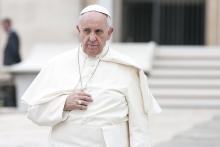
In a powerfully worded message, the pope said he wanted to encourage media professionals to engage in “constructive forms of communication that reject prejudice” and help create a world of “realism and trust.”
The pope’s message came days after President Trump launched a bitter attack on news media over its reporting on the size of his inauguration crowd.
In his message, Francis said he was concerned about the focus on “bad news” that included “wars, terrorism, scandals and all sorts of human failure” by a media industry that thinks good news doesn’t sell and where the “tragedy of human suffering and the mystery of evil” easily become entertainment.
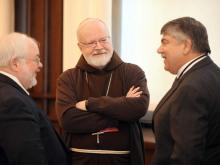
For much of its long history in the U.S., the Catholic Church was known as the champion of the working class, a community of immigrants whose leaders were steadfast in support of organized labor and economic justice – a faith-based agenda that helped provide a path to success for its largely working-class flock.
In recent decades, as those ethnic European Catholics assimilated and grew wealthier, and as the concerns of the American hierarchy shifted to battles over moral issues, such as abortion and gay marriage, traditional pocketbook issues took a back seat.
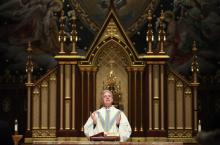
It has also been five months since Myers suspended me from all priestly ministry, for my “disobedience” in continuing to be involved with that same work against LGBT discrimination.
That’s given me a lot of time to think about what would happen when a new archbishop came to Newark, and what my future would be.

Sessions has long been, in the words of one prominent immigration advocate, the “most anti-immigrant senator in the chamber.” When George W. Bush, a self-styled “compassionate conservative” and born-again Christian, pushed a comprehensive immigration reform bill in 2007 that was supported by many business and law-enforcement officials, Sessions railed against what he called the “no illegal alien left behind bill” and led the charge against the failed effort. “Good fences make good neighbors,” he said at a press conference the year before.

Uzhunnalil claims that his captors have made repeated attempts to negotiate with the Indian government and Catholic officials, but he says nothing has happened. “I am very sad that nothing has been done seriously in my regard.
“If I were a European priest, I would have been taken more seriously by authorities, and people and would have got me released,” Uzhunnalil continued. “I am from India and perhaps am not considered of as much value. I am sad about this.”
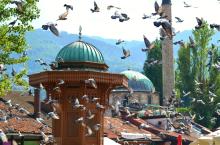
So much is at stake here at the dawn of the year 2017. The fate of the planet is in the balance as never before, as is the very integrity of our faith. We cannot waste our time hoping on a faraway unimaginable heaven where there is no war and baby Jesus sleeps safely in his manger.
What we desperately need is the disarmament that Christians and other seekers of peace throughout the world — from Dorothy Day to Dr. Martin Luther King, Jr. — have prayed and struggled for.
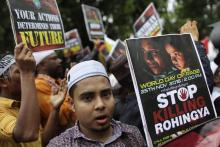
Although they have lived in the country of Myanmar for generations, the country refuses to see them as citizens. They are often seen as intruders from Bangladesh. Treatment of the group varies from violent to genocidal with many, including The Aleteia, claiming that the Myanmar government is practicing a form of ethnic cleansing.
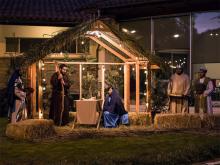
You probably don’t think of Christmas as a revolutionary holiday. Twinkling lights on trees, Starbucks gift cards, and sweet carols are not exactly the stuff of subversion. A domesticated Christmas is comforting, but considering our fraught political landscape today, we might find better lessons by reflecting on the disruption caused by Jesus’ birth, and the radical implications of his life.

According to Agenzia Fides, the Vatican’s official news agency, soldiers forcefully entered the homes of three activists from a human rights group called Coalition des Femmes Pour la Protection des Droits Humanis on Dec. 19. The three women ad hrecently traveled along rural areas of the country to raise awareness about power structures and the need for President Kabila to step down after his expired mandate. They received numerous telephone threats that may have been a precursor to the kidnapping and violence that they later faced.

As Pope Francis officially opened this year’s Christmas Nativity scene in St. Peter’s Square, he said Jesus was a “migrant” who reminds us of the plight of today’s refugees.
Francis told donors who contributed both the Nativity set and an 82-foot tree that the story of Jesus’ birth echoes the “tragic reality of migrants, on boats, making their way toward Italy,” from the Middle East and Africa today.
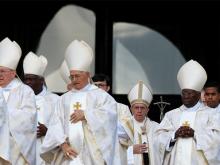
“Pope Francis has a lot of explaining to do by approving the newest Vatican instruction,” said Francis DeBernardo, executive director of New Ways Ministry, which campaigns for LGBT rights in the church.
“Francis’ famous ‘Who am I to judge?’ statement in 2013 was made in response to a question about gay men in the priesthood,” DeBernardo said. “That response indicated very plainly that he did not have a problem with a gay priest’s sexual orientation.
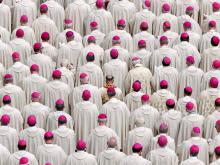
The Vatican has launched a website as part of its efforts to protect children from clerical sexual abuse and promote healing and reconciliation.
It’s the first time that the Vatican has published resources and documents on the issue, and the site is sponsored by the commission set up by Pope Francis to protect minors.

If I’ve learned anything since my time in Rome, it’s that people — not just Catholics — are hungering to connect peace with justice. This is why those of us who traveled to Rome just before the election, accompanied by Stockton, Calif., Bishop Stephen Blaire, and Houma-Thibodaux, La., Bishop Shelton Fabre, are preparing for a regional WMPM meeting in Modesto, Calif., in February.

Even in his death, announced on Nov. 25, Castro defied the church by requesting that his remains be cremated, a practice accepted but discouraged by the Vatican.
But his death could also embolden the church to take a more proactive role on the communist island, in the years to come, and bolster its budding relationship with his brother, President Raúl Castro, said Enrique Pumar, head of the Sociology Department at Catholic University of America, who has studied the Catholic Church in Cuba.

An American missionary priest, killed in Guatemala in 1981, has moved a step closer to being named a Catholic saint, after Pope Francis declared him the first-ever American martyr.
The Rev. Stanley Rother, a priest from the Archdiocese of Oklahoma City, served for nearly 15 years in Guatemala before being shot dead, during the country’s bloody civil war that divided the country from 1960 to 1996.
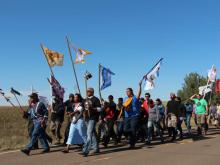
Does Pope Francis have a position on the Dakota Access Pipeline?
That’s one question he hasn’t been asked, and he might demur if pressed on such a specific issue. But in his landmark encyclical on the environment published last year, and in other statements, Francis has strongly supported arguments of the Native American-led resistance movement on three core issues: indigenous rights, water rights and protection of creation.

Fidel Castro, the Marxist revolutionary who later in life acknowledged that he was deeply influenced by Catholic teaching and welcomed a succession of popes to Cuba, has died at the age of 90.
Despite carrying out repressive measures against the church in the wake of the Cuban Revolution, and then being excommunicated, Castro saw himself as leading a struggle with some of the same noble aims as those of Christianity — including humility and concern for the poor.
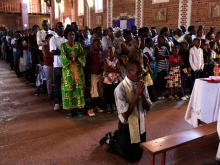
Roman Catholic bishops in Rwanda have issued an apology for the role played by individual clergy and church members, in the 1994 genocide in which nearly 1 million ethnic Tutsis and Hutus were killed.
On Nov. 20, the apology was read aloud in all Catholic churches, in the local Kinyarwanda dialect. It came at the end of Pope Francis’ Jubilee Year of Mercy.
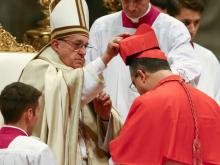
At a solemn ceremony in St. Peter’s Basilica, to elevate 17 new cardinals, Pope Francis, on Nov. 19, delivered a ringing plea to the world, and his own Catholic Church, to reject “the virus of polarization and animosity," and the growing temptation to “demonize” those who are different.
The pontiff’s address came across as a powerful, gospel-based indictment of the populist and nationalist anger roiling countries around the world, displayed most recently by the stunning election of Donald Trump as president of the U.S.

I remember the crunch of the snow beneath my boots, and the feel of my mitten in his hand, when the time was right to share my secret: “Dad,” I said, “I’m going to be a priest.”
Although it was over 50 years ago, I still remember the look on his face. He was a big shot at General Electric Co., but he was a sensitive, loving man. He stopped and looked at me, with sad eyes and pursed lips, perhaps gathering his thoughts.
Finally, he simply said, “MaryAnn, they don’t let girls be priests.”